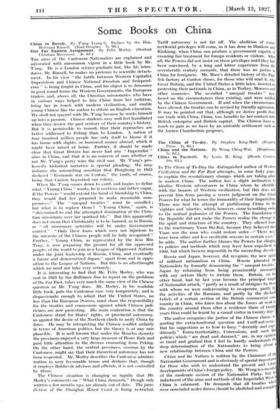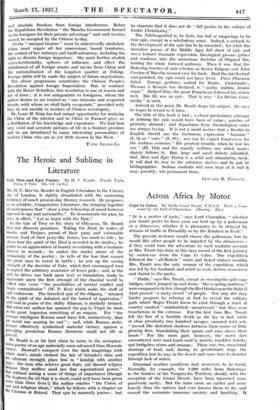IN The China of To-Day the distinguished author of Western
Civilization and the Far East attempts, in some forty page', to explain the revolutionary changes which are taking place in modern China. The author, has a slight inclination to idealize Western adventurers in China whom he identifies with the bearers of Western civilization, but this does not prevent him from passing a severe judgment on the Great Powers for what he terms the immorality of their Imperialism. There was first the attempt at partitioning China in the 'eighties and 'nineties, which, however, came to nothing owing to the mutual jealousies of the Powers. The foundation of the Republic did not make the Powers realize the change in the spirit and structure of the country. They offered loan. to the reactionary Yuan Shi-Kai, because they believed that 'Plain was the man who could restore order—" There mu have been other and less creditable reasons in certain cases," he adds. The author further blames the Powers for clinging to policies and methods which may have been expedient in 1900, but which became impossible in the succeeding decades.
Russia and Japan, however, did recognize the new spirit of militant nationalism in China. Russia placated the Nationalists by formally denouncing the " unequal treaties," Japan by refraining from being prominently associated with any actions likely to irritate them. Britain, on the other hand, had by last year become the principal target of Nationalist attack, "partly as a result of intrigues by those with whom we were endeavouring to co-operate, partly by the activities of the Russians, and partly by .the die-lord beliefs of a certain section of the British commercial emir munity in .China, who knew less about the forces at work in the country around them after a residence there of twent) years than could be learnt by a casual visitor in twenty days, The author recognizes the justice of the Chinese claims re garding the extra-territorial question and tariff-autonomy. But his suggestions as to how to bury "decently and expe. ditiously" Extra-territoriality, Concessions, and such like policies which "are dead and damned," are, in my opinion. so timid and gradual that I feel he hardly understands th deep determination of the Nationalists to bring about new relationship between China and the Powers.
China and the Nations is written by the Chairman of Nationalist Government and is obviously of special irnportan for those who wish to understand the present and fatu developments of China's foreign policy. Mr. Wong is a menthe of the moderate section of the Nationalist Party, but In indictment of the aims and methods of the Imperialist West China is vehement. He demands that all treaties will' were concluded under duress,sbould be abolished and comPlet and absolute freedom from foreign interference. Before the Republican Revolution "the Manchu Government fawned on the foreigner for their private advantage" and such treaties ' cannot be accepted by the Chinese to-day. • All the "unequal treaties "must he'unkeServedly- abolished: China must regain all her -concession-4, leased territories, the control-of her railways and tariff-autonomy, including the right to dismiss' foreign inspector4:. She must further abolish extraterritoriality, spheres of influence, and effect the Withdrawal of_all foreign armies and navies trom. China and the nationalization of the Legation quarter at Peking. Foreign debts, will be Made the subject of future negotiations. The above programme constitutes the 'Chinese' People's Revolution *against foreign Imperialism. Bin, in 'contrast with the Boxer Rebellion, this reVolirtion is one of reason 'arid not of force; -it' is not antagonistic to foreigners, Whom 'the author desires to see treated -as "our intimate and respected friends, with whom we shall fairly co-operate," provided only they do not meddle in matters of,, Chinese sovereignty.- - Mr. Louis M. King has had unique opportunity for studying the China of the interior and in China in Turtnoil. give; us a distillation-of his knowledge and experience. We find here very vivid and accurate pictures of life in a frontier province and we are introduced to many interesting personalities of modern China who are ai yet little known in the West.
TANG LEANG-LI.































































 Previous page
Previous page